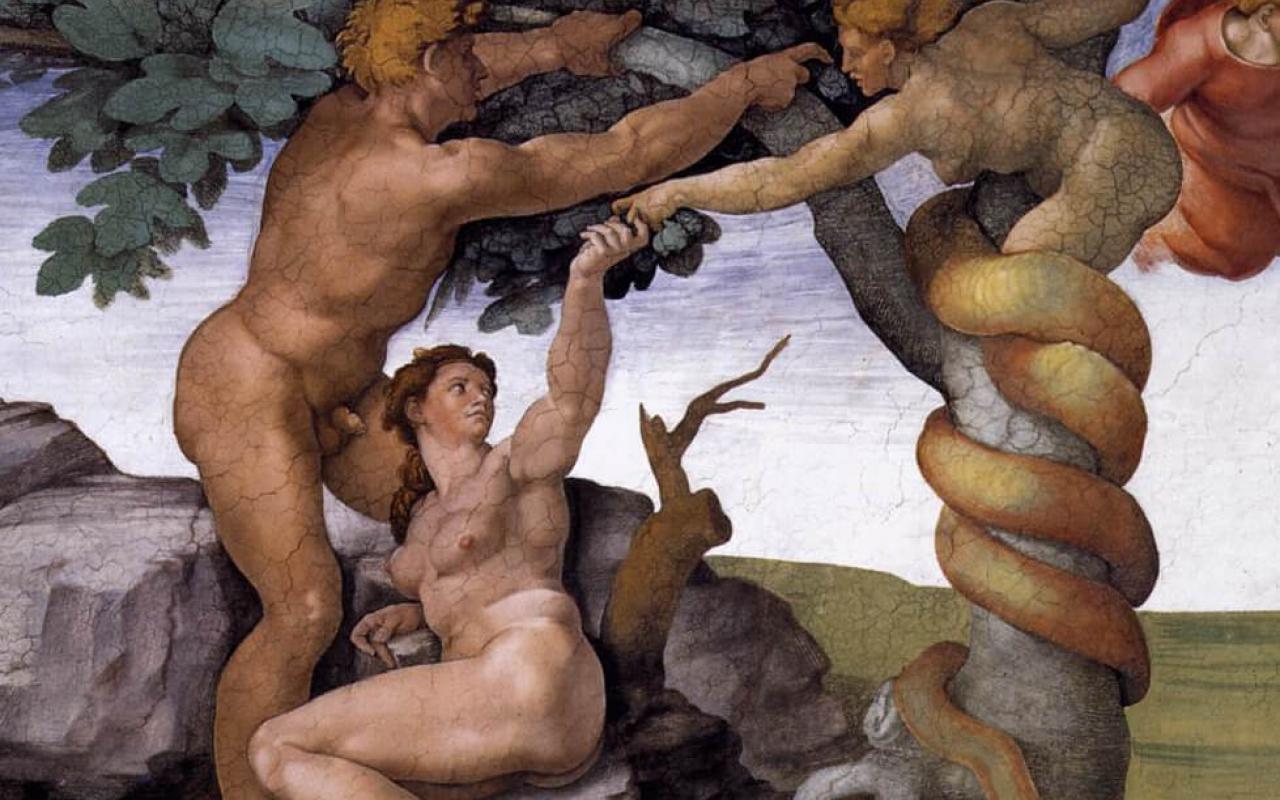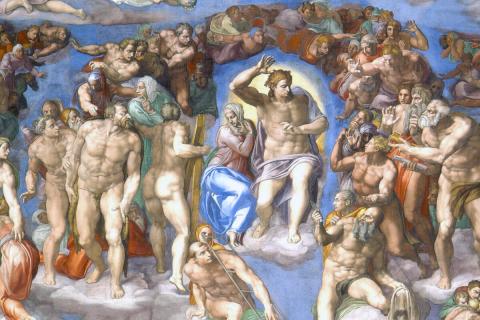
Does the evil we so constantly experience arise because of a deep moral flaw within each individual person, or does it come upon us from a source outside of us?
"Certain new theologians dispute original sin, which is the only part of Christian theology which can really be proved" (G. K. Chesterton, Orthodoxy).
"All have sinned and fall short of the glory of God" (Romans 3:23).
Consider this situation: An experienced physician is spending time with a friend he has known since childhood and who is now in the middle of a busy life filled with family, work, and recreation. The doctor notices telltale signs of a serious but hidden disease, which if caught in time can be entirely cured, but if not treated will inevitably bring on death. He prevails on his friend to come to his clinic and administers tests showing that the disease is present and rampant. He then explains the necessary remedy: a major surgical operation, a course of medicines, and a change of lifestyle, the result of which will be a complete cure. But his friend doesn’t want to hear it. He is in denial about his disease. He has convinced himself that he isn’t seriously ill. He is too attached to his current way of living, and he doesn’t want to go through the trouble of medical procedures and the difficult process of changing long habits. In the face of this kind of delusion, what will be the likely attitude and action of a conscientious doctor toward his ailing but stubborn friend? He will try to convince him that he is really very sick. He will bring him the difficult news of his illness, not because he enjoys bad news, but because he is deeply concerned for his friend’s welfare, and an accurate diagnosis of his illness is the only road to the good news of his cure.
Jesus, the friend of humanity, speaks of himself as a physician who has come to cure our ills (cf. Matthew 9:12). Because he cares deeply for us, he needs to give us a true diagnosis of what is ailing us so that we can be set on the path of spiritual health. He knows that though we were meant for goodness in communion with God, our state of rebellion against God has brought upon us a deadly moral wound that will kill us if it is not addressed.
When Jesus began preaching the Gospel of the Kingdom, many prostitutes and tax collectors flocked to him, not because he overlooked their sins, but because they knew they were sick and they saw that he had come to help them. Many among the Pharisees kept aloof from Jesus and eventually sought to destroy him because they were in a state of moral denial. They were unwilling to face the fact of their own deep moral wound. The heart of the Pharisaic attitude that so grieved Jesus was expressed in a parable he told about the prayer of a Pharisee: “God, I thank you that I am not like other men, extortioners, unjust, adulterers, or even like this tax collector” (Luke 18:11). On another occasion he said to a group of Pharisees, “If you were blind, you would have no guilt; but now that you say, 'We see,' your guilt remains” (John 9:41). Jesus needed to shake the Pharisees out of their illusion and awaken them to their true state. They could not receive the good news of their cure unless they first realized the bad news of their disease.
We are living in a deeply Pharisaic age. Our culture as a whole is in massive denial concerning our true moral condition, and that delusion tends to trouble the minds of Christians as well. Many of us think that we are fundamentally “good people.” Of course we have our little faults; but after all, we are doing pretty well morally, not because we have been reborn in Christ and by his grace have been saved from death and begun our moral cure, but because moral goodness is natural to us. To the degree that this attitude takes hold, the whole of Jesus’ teaching and the sacrificial offering of his life for our sins ceases to have any meaning. If we are doing fine, we don’t need a Savior. If we are not really sick, we have no use for a physician. Christianity is then re-invented as a nice boost for helping us to smooth out the small wrinkles of our moral lives and to help us “reach our potential.” The world around us can be pardoned for responding to this toothless form of faith with a glassy-eyed yawn and turns away to look for something more gripping.
Denial of the Fall
As G. K. Chesterton once wrote, the doctrine of original sin was the only part of Catholic theology that could really be proved. How did such an obvious doctrine get so lost among us? Why are we, as a culture, so increasingly deluded about our true state? It is not because the modern world has lost a sense of the world’s evil, nor is it because we have ceased to have any interest in questions of moral goodness. Our culture is very morally aware and concerned. It is rather because we are coming under the growing influence of a particular modern religion that could be broadly called Progressive Utopianism.
No one doubts the existence of great evils in the world. Both Christians and Progressive Utopians see injustice and oppression and deplore it. The all-important question for practical purposes is: what is the source of that evil? How is it to be addressed and if possible cured? We don’t subject a patient to a course of remedies until we know the nature of the illness. The decisive point concerning the cause of evil comes down to a simple question: does the evil we so constantly experience arise because of a deep moral flaw within each individual person? Or does evil come upon us from a source outside of us? The practical steps one takes to address the roots of evil will depend on the answer to that question.
Here is what Jesus said about it: “Hear me, all of you, and understand: there is nothing outside a man which by going into him can defile him; but the things which come out of a man are what defile him… For from within, out of the heart of man, come evil thoughts, fornication, theft, murder, adultery, coveting, wickedness, deceit, licentiousness, envy, slander, pride, foolishness. All these evil things come from within, and they defile a man” (Mark 7:14-15; 21-23). The apostle James taught the same lesson. “What causes wars, and what causes fightings among you? Is it not your passions that are at war in your members? You desire and do not have; so you kill. And you covet and cannot obtain; so you fight and wage war” (James 4:1-2).
This explains why, when Jesus walked among us, he said and did so little to change the external structures of society. He saw with perfect clarity the real sources of the world’s evil, and after “binding the strong man” and freeing his disciples from slavery to demonic forces, he concentrated his mission on changing the human heart. Only then would our attempts to make the world a better place have any effect.
When Christians speak about the sources of the evils that plague humanity, they have traditionally used the triad: “the world, the flesh, and the devil.” Among these three there is a hierarchy of causation. Christians acknowledge both internal and external sources of evil. Both the devil and the world can inflict evil upon an individual from outside. But the fundamental problem came with our rebellion and the corruption we brought upon ourselves. The devil and the outside world can influence us only because of the moral flaw within us. It was after our first parents sinned that the devil gained power over them, and the human propensity to sin continues to be the root cause of the world’s evil.
Christians have understood the importance of the social environment in aggravating or lessening evil. The long history of Christian concern for education, parenting, and a just social order make that clear. But Christians also know that it makes no sense to try to better the world as long as the debilitating moral wound in each person has been left unattended. This explains why, when Jesus walked among us, he said and did so little to change the external structures of society. He saw with perfect clarity the real sources of the world’s evil, and after “binding the strong man” and freeing his disciples from slavery to demonic forces, he concentrated his mission on changing the human heart. Only then would our attempts to make the world a better place have any effect.
Progressive Utopianism, the working religion of the modern world, has reduced that Christian triad to one. The devil does not exist and the human soul is innocent and good. That only leaves the world as the source of evil. Any taint found within us is an infection or corruption that has come from the external environment. From this blind reduction of reality comes a necessary utopian impulse. According to this way of thinking it is at least theoretically possible to eradicate the evil of the world by changing external circumstances, either by protecting the individual from evil forces or by altering external reality and ridding it of its evil qualities. If the problem is somewhere “out there,” then those who desire goodness need to become revolutionary in order to bring what is out there into conformity to our notions of goodness.
The means by which Progressive Utopians try to bring about a better world is always some kind of applied knowledge. Modern religion has therefore often been described as Gnostic, from the Greek word gnosis, meaning knowledge. Just what kind of knowledge is deemed necessary for refashioning the world is a matter of dispute among Progressive Utopians. Sometimes it is technological mastery of the natural world, especially the biological world. Sometimes it involves knowledge of social engineering based on various sociological theories. Sometimes it is knowledge of the human psyche that will free the individual from influences and accretions from outside that have harmed it.
The requisite gnosis also usually identifies a group of people who have so allied themselves to the world’s evil that they have become part of that evil, and who must be eliminated to allow the new world to emerge. According to the particular shape of the proposed utopia, it is the aristocracy, the bourgeoisie, the Jews, the promoters of patriarchy, the hetero-normativists, the racists. That group is standing in the way of progress and needs to be marginalized or cancelled if the world is to be made better.
This Gnostic Utopian way of going at the problem of evil makes a certain theoretical sense, but only if the fundamental principle behind it is true: that humans are basically good and that evil comes upon us only from the outside. But that fundamental principle is massively and momentously wrong. When Jesus spoke of bettering the world, what he called “taking the speck out of your brother’s eye,” he insisted that something else had to happen first. “You hypocrite, first take the log out of your own eye, and then you will see clearly to take the speck out of your brother's eye” (Matthew 7:5). No one wants a blind doctor doing brain surgery. No one should want blind revolutionaries remaking humanity and society. The results will necessarily be catastrophic - as has always happened when such people have gotten their hands on the controls. The sad results of all the modern utopian projects that have littered the world with millions of dead and numbed the souls of tens of millions more are all too predictable. Those who know nothing of humanity and are blind to the sources of evil will be a menace to those they are supposedly helping, even if their intentions are good.
The better way is to keep our eyes and ears open to Wisdom incarnate. By sending his own Son into the world to save our race, the first great Word spoken by God to his creatures was a ringing: “I love you and I want to live among you and give you all good things!” The next thing he said, and the first word out of the mouth of Jesus in Mark’s Gospel, was: “Repent!” “Change!” The Divine Doctor’s great love for us leads him to announce the bad news of our disease so that we will be ready to receive the wonderfully Good News of our cure.
It is a worthy thing to want to make the world a better place. But if we want that hope to be more than a bland and unmeaning platitude, the only sensible and effective starting point is to go to the source of the evil and get about the hard work of changing our own hearts.
Further Reading
- Elizabeth Scalia, "Hello, Original Sin! Adam and Eve Meet Vulnerability and Accountability"
- Joel Schorn, "What is Original Sin?"

